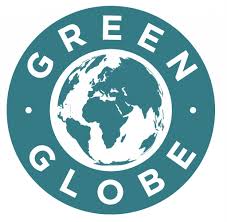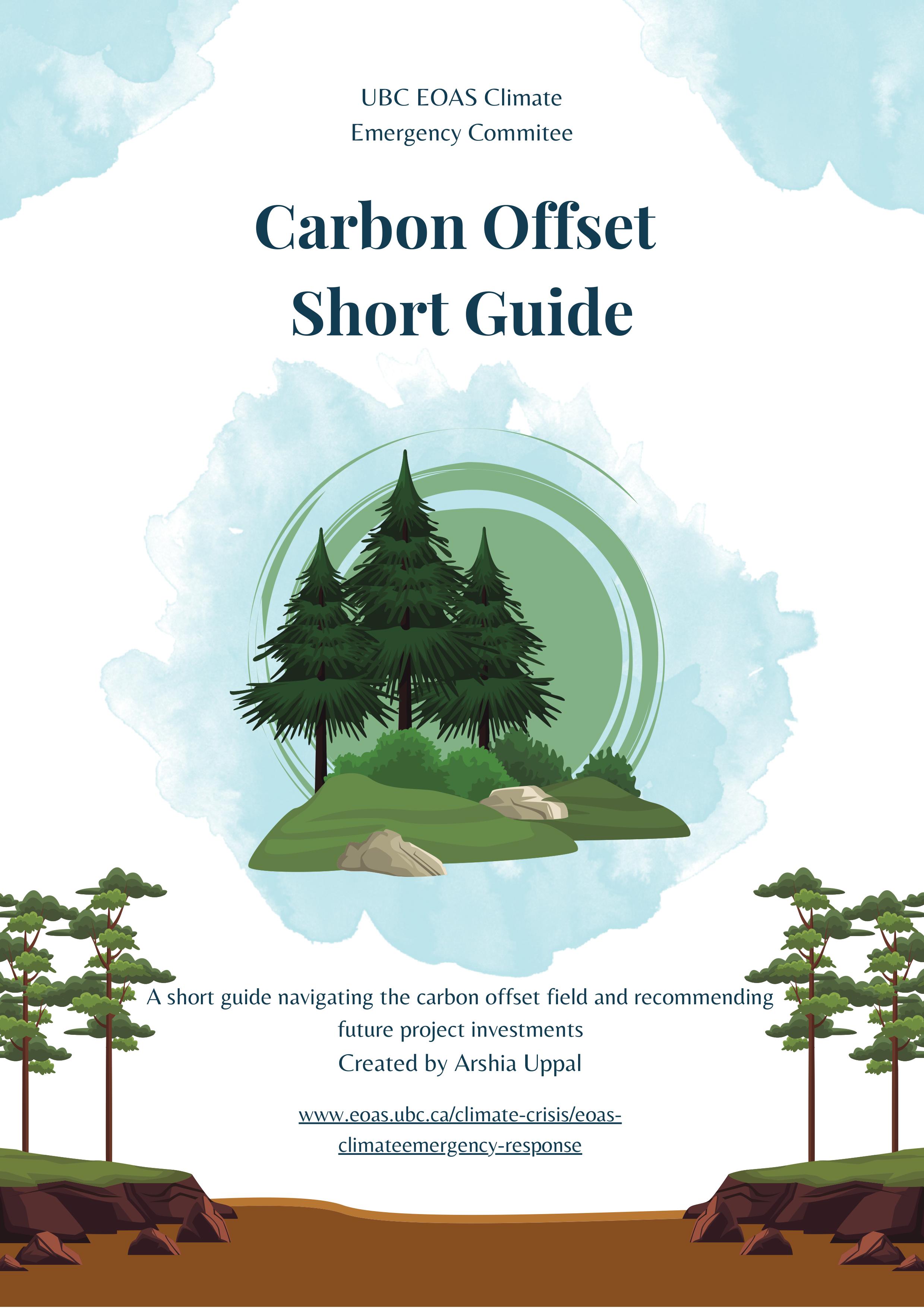Climate Resources
EOAS Carbon Offset Guide, sustainable travel guidance, one-stop climate science resources, and skills to navigate through climate anxiety
EOAS Carbon Offset Short Guide
Flip book version: click here
PDF version: click on the image below for an expanded PDF.
EOAS Sustainable Travel Guidance
These resources and recommendations exist to help EOAS personnel reduce emissions and promote sustainable travel.
UBC has made a commitment to combat climate change, stating that addressing the climate crisis is critical to the University’s key functions.
Air travel contributes approximately 2% of anthropogenic climate change (Lee et al., 2020) but is one of the most difficult industries to decarbonize owing to its reliance on liquid fuel and necessity for lightweight equipment.
UBC business-related air travel emissions generate 26,333 - 31,685 tonnes of CO2 emissions each year (Wynes & Donner, 2018).
As such, the UBC community has a responsibility to minimize travel wherever possible, and choose sustainable options when travel cannot be avoided. A growing group of UBC faculty members have formally pledged to minimize their travel, through the UBC Zero Emissions University website.
For more information on UBC sustainable travel and purchasing recommendations, see the UBC Sustainable Purchasing Guide.
Aim to avoid traveling whenever possible, and find other ways of being present at meetings, events or conferences. Tele or Videoconferencing is an ideal, sustainable choice for communications and meetings, between UBC Vancouver and UBC Okanagan and anywhere in the world, and will save time and money. UBC has a campus-wide license for Zoom as a platform for delivering courses online and larger meetings. Zoom is an easy-to-use video conferencing platform that offers a wide range of features.
 Visit Green Globe to make informed decisions about traveling green, and learn more about the sustainability performance of travel and tourism businesses and their supply chain partners. If travel cannot be avoided, using reputable offsets is another way to minimize the climate impact of your journey. However, it is important to keep in mind that offsets are not a perfect solution: see the Zero Emissions University Page for more information.
Visit Green Globe to make informed decisions about traveling green, and learn more about the sustainability performance of travel and tourism businesses and their supply chain partners. If travel cannot be avoided, using reputable offsets is another way to minimize the climate impact of your journey. However, it is important to keep in mind that offsets are not a perfect solution: see the Zero Emissions University Page for more information.
 Offsetters is a Canadian website with Canadian offsetting projects and its founders are UBC alumni. Calculate the emissions from your journey and offset the emissions through the Offsetters carbon sequestration or green energy projects.
Offsetters is a Canadian website with Canadian offsetting projects and its founders are UBC alumni. Calculate the emissions from your journey and offset the emissions through the Offsetters carbon sequestration or green energy projects.
 Use the Green Key website to find green hotels for your stay. There are many Green Key hotels in Vancouver, mostly downtown. Check out this link from UBC Finance on three ways to make your hotel stay greener.
Use the Green Key website to find green hotels for your stay. There are many Green Key hotels in Vancouver, mostly downtown. Check out this link from UBC Finance on three ways to make your hotel stay greener.
One-stop Climate Resources
Please see below for a list of climate science resources curated by the EOAS Climate Emergency Committee.
- Climate Change: The Basics by the Climate Atlas of Canada
- 5 most important climate change datasets by Dr. Stefan Rhamstorf, University of Potsdam, Germany
- Essential Principles of Climate Literacy by the National Oceanic and Atmospheric Administration of the United States
- Climate Change: Evidence and Causes by The Royal Society, United Kingdom
- Rapid attribution analysis of the extraordinary heatwave on the Pacific Coast of the US and Canada June 2021 - a rapid-release World Weather Attribution paper co-authored EOAS scientist that made the front page of the N.Y. Times. See News to know more.
- Intergovernmental Panel on Climate Change (IPCC) - the United Nations' leading global authority on the science of climate change
- Global Climate Change by the National Aeronautics and Space Administration (NASA), United States
- EOS Climate Science - The latest in climate science from the American Geophysical Union (AGU)
- anada's Changing Climate Report - Written by Canada's leading environmental scientists
- Position Statement on Climate Change by Canada's leading Atmospheric Sciences and Oceanography experts
- UBC Climate Emergency - The community engagement and action plan for aligning UBC's teaching, research, operations, and outreach with the recognition of a Climate Emergency
- The UBC Campus Climate Action Plan, Greenhouse Gas Inventory, and Energy and Emissions Plan
- UBC Sustainability Initiative - A UBC campus unit that undertakes key cross-cutting functions such as connector, curator, and facilitator of a wide breadth of sustainability programs and activities across campus
- UBC Climate Hub - A student-led office of the UBC sustainability Initiative with the mandate to connect and empower university and community stakeholders to take bold climate action
- UBC Sustainability Scholars Program - A paid internship program that connects UBC graduate students with research projects that advance sustainability in regional communities
- UBC Sustainability Course Finder - A comprehensive list of courses across all disciplines at UBC, on all topics related to sustainability, environment, and climate change
- Pacific Institute for Climate Solutions - A collaborative partnership between 4 universities in British Columbia, including UBC, that develops and implements actionable climate solutions for communities in British Columbia and worldwide
- University Climate Change Coalition (UC3) - A collaborative coalition of universities across North America that leverages relationships and expertise to accelerate local climate solutions and build community resilience
Climate Anxiety Resources
Climate anxiety is a valid response to experiencing or witnessing difficult or traumatic climate change impacts and issues. We cannot always control our feelings of anxiety and grief, but we can learn strategies and coping skills to redirect and manage them in healthy and proactive ways. Click the drop down menu below to view some starting points, courtesy of the UBC Climate Hub, for navigating through and beyond climate anxiety for students, faculty and staff, and everyone.
For Students:
- Climate Wellbeing Series: Climate Anxiety - Climate Hub social media posts about climate anxiety
- Climate Wellbeing Series: Moving Through and Beyond Climate Anxiety - Climate Hub social media posts about strategies for moving through climate anxiety
For Faculty and Staff:
- Climate Change Anxiety: Researcher shares tips to avoid feeling overwhelmed - A researcher's story about navigating climate anxiety
For Everyone:
- Climate Hub Wellbeing Workshop Handout
- Stressed About Climate Change? Eight Tips for Managing Eco-Anxiety
For a more complete list of links, resources, and organizations to connect with, see this handout.

